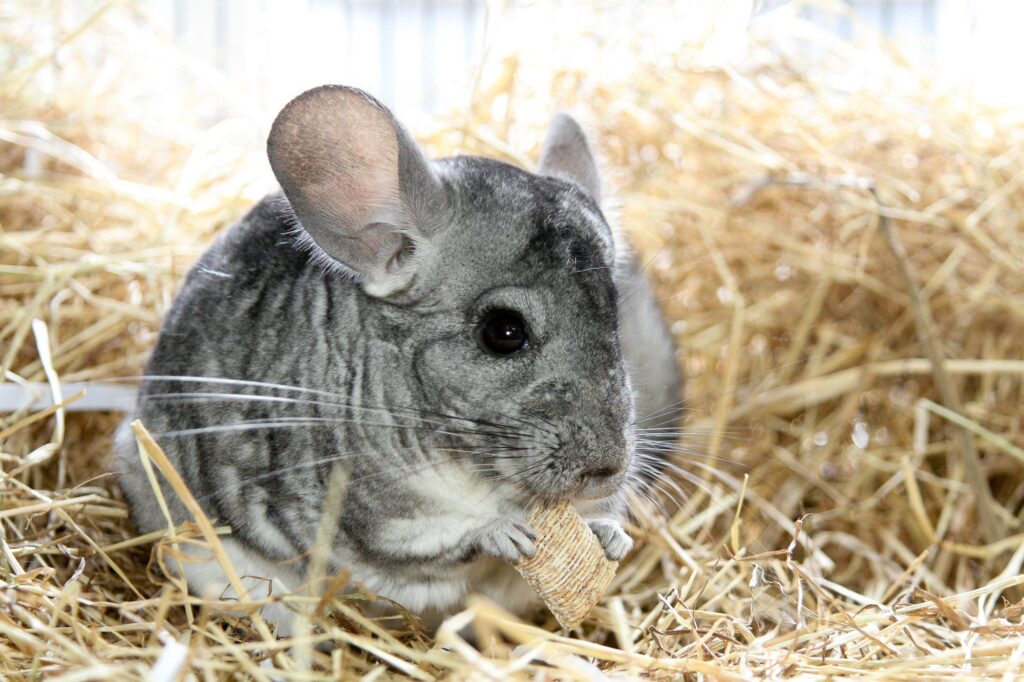Table of Contents
ToggleIntroduction

Chinchillas exhibit intelligence in several dimensions. They display problem-solving skills in their interactions with their environment and the challenges it presents. How Smart Are Chinchillas? These abilities are not only vital for their survival in the wild but also influence their adaptability to captive environments.
Socially, chinchillas exhibit intriguing behaviors that hint at their cognitive capabilities. Their interactions with other chinchillas, their communication through vocalizations and body language, and their ability to form bonds within their groups all offer a fascinating glimpse into their social intelligence.
Chinchilla Intelligence
Cognitive Abilities of Chinchillas
Problem-Solving Skills: Chinchillas exhibit a notable degree of problem-solving insight. Whether in the wild or captivity, they demonstrate resourcefulness when faced with challenges. In their natural habitat, this problem-solving skill is crucial for locating food and navigating their rugged terrain. In captivity, chinchillas often find ways to interact with their environment, which can be both amusing and impressive. They may figure out how to open latches, access food, or explore their surroundings, reflecting their innate problem-solving abilities.
Memory and Learning: Chinchillas possess a capacity for learning and memory. They can quickly learn to associate specific cues or sounds with food or other rewards, making them amenable to training. This learning ability allows them to adapt to changes in their environment and respond to familiar caregivers.
Social Intelligence
Interactions with Other Chinchillas: Chinchillas are social animals and display a form of social intelligence in their interactions with other chinchillas. They engage in various social behaviors, from grooming and huddling for warmth to cooperative foraging. Their interactions within a group contribute to their survival in the wild and are an essential aspect of their social intelligence.
Communication and Social Behaviors: Chinchillas communicate using a combination of vocalizations, body language, and scent marking. Their vocal repertoire includes chirping, barking, and purring, which they use to convey various messages, such as alerting others to danger or signaling their readiness to mate. Through body language, they express dominance, submission, and other social cues. These complex forms of communication underscore their social intelligence and ability to navigate group dynamics effectively.
Navigational Skills: Chinchillas are adept at navigating their environments, which often include rocky and challenging terrain in their native habitat. They can leap precisely and balance on narrow ledges, showcasing their navigational abilities. In captivity, this skill can be observed in their agile movements, whether they’re jumping from one platform to another or exploring their enclosures.
Survival Instincts: In the wild, chinchillas exhibit strong survival instincts. They are well adapted to escape predators, using their speed and agility to evade threats. Their ability to remain vigilant and detect danger is crucial for their survival. Even in captivity, chinchillas maintain vigilance, suggesting their survival instincts remain intact.
Chinchilla Behavior
Exploration and Curiosity
Chinchilla Playfulness: Chinchillas are naturally playful creatures. Their playful antics often involve leaping, bounding, and darting around their enclosures in a flurry of energy. This playfulness is not only entertaining to observe but also indicative of their curiosity about the world around them. It’s a testament to their engaging and lively nature.
Interaction with Toys and Objects: Chinchillas are keenly interested in exploring their environment and interacting with objects. They often investigate new toys, chew on objects to maintain their dental health, and engage in behaviors that mirror their inquisitive nature. Providing a variety of safe toys and items for them to interact with is not only enjoyable for the chinchillas but also an essential part of their mental and physical enrichment.
Communication and Social Behaviors
Vocalizations: Chinchillas communicate through various vocalizations, each serving a distinct purpose. Their vocal repertoire includes chirping, barking, and purring, among other sounds. Chirping may indicate excitement or distress while barking is often used to alert others to potential danger. Purring is a sign of contentment. Recognizing and understanding these vocal cues is essential for interpreting a chinchilla’s emotional state and needs.
Body Language: Chinchillas use body language to convey their intentions and emotions. They may puff up their fur to appear larger when feeling threatened or flatten it against their bodies to show submission. Various postures, tail positions, and ear orientations offer valuable insights into their moods and social dynamics. Understanding their body language is crucial for chinchilla owners to create a harmonious and stress-free environment.
Problem-Solving and Adaptability
Chinchillas in Captivity: Chinchillas demonstrate impressive problem-solving skills, especially when placed in captivity. In this setting, they may face challenges like closed doors, puzzles, or food puzzles, all of which they tackle with determination and creativity. Their ability to navigate their enclosures, access food, and interact with their surroundings is a testament to their intelligence.
Adapting to Changes in Their Environment: Chinchillas exhibit adaptability when faced with environmental changes. Whether it’s a new enclosure, different cage accessories, or rearranged furnishings, they are quick to explore and adapt. This adaptability is not only fascinating to witness but also essential for their overall well-being and resilience.
Chinchilla Training

Training a chinchilla involves the process of teaching and conditioning these small rodents to respond to specific cues or commands. It can be an enjoyable and mutually beneficial endeavor for the chinchilla and its owner. Chinchilla training fosters cooperation, communication, and trust, ultimately enhancing the bond between the animal and its caregiver.
Chinchillas are naturally intelligent, curious, and observant, making them amenable to training. However, it’s important to approach training with patience, gentleness, and respect for the chinchilla’s unique personality and needs.
The Potential for Training Chinchillas
Litter Training: One of the most practical aspects of chinchilla training is litter training. Chinchillas choose a specific area within their enclosure for urination and defecation. By placing a small litter box or tray filled with appropriate chinchilla-safe bedding material in this area, you can encourage them to use it consistently. Reinforcing this behavior with positive reinforcement, such as a treat or verbal praise, can be an effective training method. Litter training not only makes cage cleaning easier but also contributes to maintaining a clean and hygienic living environment for your chinchilla.
Basic Commands and Tricks: Chinchillas can also get instructions to respond to basic commands and perform tricks. While they may not be as versatile as dogs, chinchillas can learn simple commands like coming when called or responding to a hand signal and using frequency of use as a motivator in training. As with any training, it’s important to proceed gradually and at the chinchilla’s pace, being mindful of their comfort and well-being. Remember that chinchillas have individual personalities, and some may be more responsive to training than others.
Conclusion
Chinchillas, those soft and adorable rodents with enchanting fur, have proven to be far more intelligent and engaging than their diminutive stature might suggest. In this exploration of chinchilla intelligence and behavior, we have unveiled a world of captivating abilities and behaviors that are both endearing and impressive.
Chinchillas exhibit cognitive abilities that encompass problem-solving skills, memory, and learning. They demonstrate resourcefulness when confronted with challenges, showcasing an innate capacity for adaptability and learning. These abilities not only enhance their survival skills in the wild but also make them adaptable and inquisitive companions in captivity.







